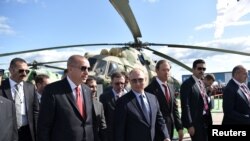Turkish President Recep Tayyip Erdogan met Tuesday with Russian counterpart Vladimir Putin in Moscow for talks aimed at bridging the deepening divide over the war in Syria. Russia supports the government of Syrian President Bashar al-Assad, while Turkey backs some rebel groups.
News reports say that after the talks, both leaders said they hoped to work together to ease tensions in Syria's Idlib province. Erdogan has called for an end to a Russia-backed Damascus offensive against rebels in Idlib. The timing of the offensive comes after Turkey and the United States agreed on a military operation into Syria. Observers speculate Putin is seeking to undermine the deal.
The agreement envisages creating a buffer zone in Syria to protect Turkey's border from the Syrian Kurdish militia, the YPG. Ankara deems the YPG a terrorist organization linked to insurgents inside Turkey. The YPG, however, is a key Washington ally in the fight against the Islamic State terror group.
On Monday, Erdogan issued a thinly veiled warning to Washington, saying that with or without U.S. cooperation, Turkey would enter Syria to create what Ankara calls a "peace zone." Erdogan made the comment as he addressed thousands of supporters at an event to commemorate a historic military victory.
"Our UAVs [uncrewed air vehicles] and helicopters have entered the region. Very soon, our ground troops will also enter the region," Erdogan said. "If we are faced with attempts to stall, we will carry our own plans into effect."
U.S. and Turkish officials worked out the agreement Aug. 7 to establish the buffer zone. Ankara says the area is necessary to secure its frontier from the YPG. The August deal stopped Turkey from unilaterally intervening against the YPG.
Washington's support of the YPG, which has extended to providing the group weapons, has poisoned relations between the U.S. and Turkey, two NATO allies.
U.S.-Turkish tensions have seen Ankara turning toward Moscow. Erdogan and Putin have met regularly as part of rapprochement efforts.
Observers suggest Washington could see the deal with Ankara as a step to improve wider relations and lure Ankara away from Moscow.
This week, the YPG reportedly withdrew its forces and heavy weapons from Tal Abyad and Ras al-Ayn in northern Syria as part of the U.S.-Turkey deal.
U.S. and Turkish generals recently flew by helicopter to survey the Syrian border region. A joint command center has been built close to the frontier; however, few precise details on the nature of the buffer zone or a timetable for the start of the operation appear to have been agreed on.
Agreement conflicts
Turkish and YPG officials continue to give conflicting versions of the agreement, while Washington has mostly refused to be drawn into commenting on the nature of the deal.
Ankara is demanding a 40-kilometer-deep zone, while Washington reportedly has only agreed to an initial five kilometers that could be expanded to 18 kilometers.
The chain of command for the operation also remains unclear.
"The whole deal is opaque. There are no details," said Huseyin Bagci, professor of international relations at Ankara's Middle East Technical University.
"At the same time, we hear reports the Americans are continuing to deliver arms to the YPG. Only this week, we understand more trucks of arms have been delivered by the U.S. It's a double game," Bagci said.
'Delaying tactic'
Turkish suspicions over the deal are increasingly gaining traction within the ruling AKP.
"Those not happy with the agreement, including prominent AKP members, believe this is nothing more than a delaying tactic," said international relations lecturer Soli Ozel of Istanbul's Kadir Has University.
According to Turkish Foreign Minister Mevlut Cavusoglu, Ankara's suspicions are built on past experiences of working on Syria with Washington.
"They [the U.S.] first need to be sincere and need to understand that Turkey won't tolerate delaying tactics," he said at a press conference earlier this month. "What we say since the beginning is that a U.S. stalling tactic will not work. Unfortunately, they employed such stalling on [the Syrian city of] Manbij. They did not keep their promise," he added.
In June 2018, U.S. and Turkish officials agreed on the "Manbij Roadmap," which envisioned the withdrawal of YPG forces from the Syrian town as part of a deal to avert a Turkish offensive. Fourteen months later, the YPG remains, with many in Ankara feeling duped.
Erdogan did not carry out his threats to take unilateral action against Manbij if the roadmap was not honored. Observers suggest Ankara is still reluctant to confront Washington directly.
Buffered buffer zone
With Erdogan politically wounded after a series of recent damaging electrical setbacks, the establishment of a buffer zone is seen as a vital part of a broader strategy of the president playing the Turkish nationalist card to consolidate his electoral base.
Ankara also sees the buffer zone as crucial to returning many of the 3.5 million Syrian refugees in Turkey amid mounting public discontent over their presence.
Observers say given that U.S. forces control Syrian airspace in the region that Ankara is targeting, Erdogan would be wary of any unilateral action.
Ozel said that even if the buffer zone is created, it is unlikely to be the crushing victory Erdogan seeks.
"If there's going to be any operations into Syria, they [Turkey and the United States] will have shared command with the American counterparts. That's my understanding," he said.
"So, if Ankara's hope is, 'We should have a free hand and then do whatever we want in this territory, in which we believe our enemies are gaining strength and constitute a national security threat,' that is not my understanding of what the U.S. has said yes to," Ozel said.




